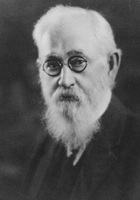 | Back to e-WV
| Back to e-WV
 The West Virginia Encyclopedia
The West Virginia Encyclopedia
 | Back to e-WV
| Back to e-WV
 The West Virginia Encyclopedia
The West Virginia Encyclopedia

George Wesley Atkinson (June 29, 1845-April 4, 1925) was the tenth governor of West Virginia. He was born in Charleston. His ancestors from Cumberland County, England, and County Armagh, Ireland, had settled in Virginia by 1750 and on the Ohio River by 1796. His parents were Col. James and Miriam Rader Atkinson. Other members of the accomplished family spelled the surname differently, including Thomas Clark Atkeson, the first dean of the School of Agriculture at West Virginia University and international leader of the Grange; Willis (William) Atkeson, governor of Georgia; and Mary Meek Atkeson, writer.
One of West Virginia’s best-educated governors, Atkinson earned a master’s degree and a Ph.D. from Ohio institutions, and studied law in Washington. He was twice married, to Ellen Eagan, with whom he had five children, and to Myra Camden. Before being elected governor, Atkinson served as Charleston postmaster, Wheeling newspaper editor, U.S. internal revenue agent, U.S. marshal, and congressman for the First District in northern West Virginia. He was a leader of the Methodists, the Masons, and the Republican Party.
Atkinson was elected governor in 1896, in an upset victory over Cornelius C. Watts of Charleston which ended 26 years of Democratic rule. As governor, Atkinson was a moderate progressive. He called for an eight-hour workday, the prohibition of the employment of children under 14 years of age, improved working conditions for women, and safety regulations in manufacturing and mining. The legislature failed to enact most of his proposals, but Atkinson continued to call for change. He championed high-quality public education, a permanent road system, and open and equal immigration, and he worked against corruption in politics and professional lobbying. He spoke against the racist Jim Crow legislation that neighboring states were succumbing to, noting that West Virginia ‘‘has never adopted a law which abridged the rights and privileges of any of its citizens.’’
The most serious issue facing Governor Atkinson was a state financial crisis arising from expanded services and low taxes. He proposed increased corporate taxes, among other measures, and in this was opposed by Republican boss Stephen B. Elkins. Senator Elkins eventually agreed to a tax increase but with concessions that split the reform wing of the party.
After serving as governor from 1897 to 1901, Atkinson became the U.S. district attorney for the Southern District of West Virginia and was then appointed by President Theodore Roosevelt as judge of the U.S. Court of Claims. Popular as a speaker on politics, economics, literature, history, and religion, the scholarly Atkinson wrote 11 books of poetry and non-fiction, including History of Kanawha County (1876), After the Moonshiners (1881), Prominent Men of West Virginia (1890), and Bench and Bar of West Virginia (1919). He also served as a longtime president of the Children’s Home Society of West Virginia.
In 1899, Atkinson composed his own epitaph and sent it to a friend. It read, ‘‘He tried to be honest; he would not lie; he never intentionally wronged his fellowmen; he sought on all occasions to lift up his fellows; he was a friend of the poor and the helpless; he never stole a dollar or a cent; and his purpose was ever to do what he could to make the world broader and better and nobler and grander because he lived in it.’’
The epitaph was not used on his stone. After Governor Atkinson died, he was buried in Charleston’s Spring Hill Cemetery. His monument gives his name and dates and four words more: ‘‘Christian – Statesman – Scholar – Gentleman.’’ In 1993, however, the Masons placed a plaque next to his monument that includes the epitaph that Atkinson wrote for himself.
Written by Barbara Smith
Atkinson, George W. & Alvaro F. Gibbins. Prominent Men of West Virginia. Wheeling: W. L. Callin, 1890.
Callahan, James M. History of West Virginia, Old and New vol. 3. Chicago & New York: American Historical Society, 1923.
Morgan, John G. West Virginia Governors, 1863-1980. Charleston: Charleston Newspapers, 1980.